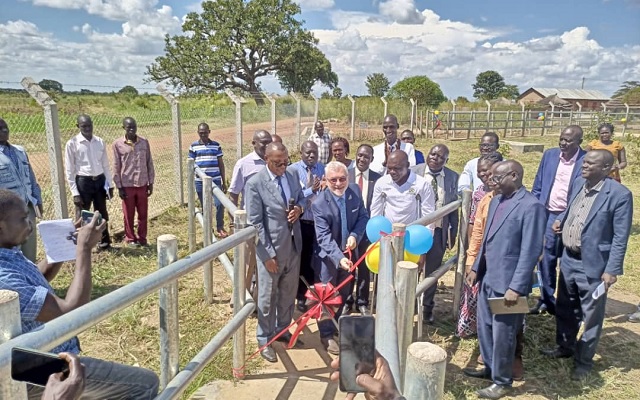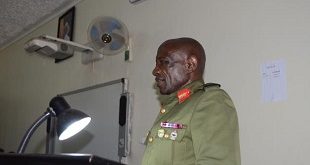
Agago, Uganda | THE INDEPENDENT | Agago District has received a livestock market worth 341 million Shillings financed under the local government excellence funds of the Development Initiative for Northern Uganda-DINU.
Alwa Livestock Market was constructed with funds from the European Union through the United Nations Capital Development Fund-UNCDF with a fully installed water source for the animals, fence, multipurpose block, wash facility, cattle crush, and loading and offloading ramp.
Located in Atula Village Wol Sub-County, the market was commissioned by the commissioner for Local Economic Development, Anthony Namara, together with Dmitry Pozhidaev, the Uganda head of the office of the UNCDF, who is also the Global Advisor of Local Government Finance.
Leonard Ojok, the LCV Chairperson of Agago district, says the market will help the district in improving the quality of livestock, which will in turn fetch the farmers more money.
He however appealed to the commissioner to relay the concerns of the farmers that the cattle rustlers need to be dealt with if the livestock market is to help change the lives of the cattle farmers.
Ojok also believes the infrastructure will widen the Omot Sub-County’s tax base and build the sub-county’s capacity to deliver quality services to the residents.
He appealed to the local leaders to be close to the community to ensure that the facility is intact and not vandalized, because they can only realize optimal use of the market if the structure is fully maintained.
The Alwa Livestock Market operates every Thursday. However, Benjamin Odur, the councilor of Opari Parish and Secretary of Production Omot sub-County, suggests that the district and sub-county leaders should permit the market to operate twice a week, to meet the demand of livestock buyers.
According to Odur, at least 100 cattle and 150 goats can be sold in the market if it is allowed to open twice a week.
Moses Opoka, the chairperson of Omot Livestock Vendors is excited about the commissioning of the market, saying it will keep the animals in order unlike in the past when the animals were sold along the roadside.
Opoka also thinks the market will attract traders from far districts within Uganda and traders from neighboring countries such as South Sudan, hence, increasing business and improving the livelihood of the livestock traders.
The Minister of Local Government, Raphael Magyezi, in a speech read by Anthony Namara, noted that Northern Uganda has endured the effects of conflict and economic hardship and is happy about the commitment by the EU and UNCDF to contribute to developing the region.
Magyezi says the livestock market will present a comprehensive strategy to uplift the lives of the people, foster economic growth, and promote sustainable development.
He noted that since Agago is predominantly agricultural, the market will enable the exchange of not only livestock but also other agricultural inputs and products, hence increasing food security, and saving farmers from the exploitation of middlemen.
Dmitry Pozhidaev, the Uganda head of the office of the UNCDF, who is also the Global Advisor to Local Government Finance, appealed to the beneficiaries of the market to plan for ways of maintaining the facility and devise ways of expanding it.
Dmitry says although the DINU project is coming to an end, but will not mark the end of the EU’s plan to support the economic development of the region, adding that they are working on some ideas and concepts to succeed DINU which will come in the near future.
Geoffrey Otema, the Agago district Commercial officer, says they are now registering the benefits of the livestock market.
Otema says the market is already getting more revenue because it was tendered at 1.5 million shillings only in 2015, but now it is at 2.25 million shillings per month.
The number of vendors has also increased from 2,000 vendors at the start of the project, but since the constructed market started operating in April 2023, the number of vendors has risen to 3,000.
Alwa livestock market attracts meat traders from Pader, Abim, Lira, Mbale, Koboko and Kampala, who come in search of big bulls for slaughter in exchange for those fit for ploughing.
*****
URN
 The Independent Uganda: You get the Truth we Pay the Price
The Independent Uganda: You get the Truth we Pay the Price


